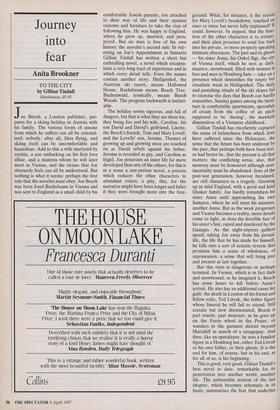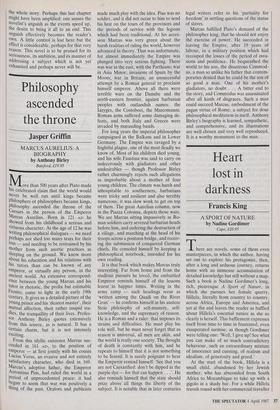Journey into fear
Anita Brookner
TO THE CITY by Gillian Tindall
Hutchinson, f9.95
Joe Beech, a London publisher, pre- pares for a skiing holiday in Austria with his family. The various forms of unease from which he suffers can all be rational- ised: nobody, after all, likes flying, and skiing itself can be uncomfortable and hazardous. Add to this a wife martyred by cystitis, a son embarking on his first love affair, and a mistress whom he will later meet in Vienna, and the strains that Joe obscurely feels can all be understood. But nothing is what it seems: perhaps the first rule that the novelist must obey. Joe Beech was born Josef Buchsbaum in Vienna and was sent to England as a small child by his comfortable Jewish parents, too attached to their way of life and their opulent customs and furniture to take the step of following him. He was happy in England, where he grew up, married, and pros- pered. But no man is free of his own history: the novelist's second rule. In rep - orting on Joe's Appointment in Samarra Gillian Tindall has written a short but enthralling novel, a novel which encapsu- lates a very long tract of experience and in which every detail tells. Even the names contain another story. Heiligenhof, the Austrian ski resort, means Hallowed House. Buchsbaum means Beech Tree. Buchenwald, ironically, means Beech Woods. The progress backwards is ineluct- able.
The holiday seems rigorous, and full of dangers, but that is what they are there for, they being Joe and his wife, Caroline, his son David and David's girlfriend, Lisette, the Beech's friends, Tom and Mary Lovell, and the Lovells' son, Jerome. Themes of growing up and growing away are touched on as David rebels against his father, Jerome is revealed as gay, and Caroline as frigid. Joe possesses an inner life far more developed than any of the others, for this is in a sense a one-person novel, a process which reduces the other characters to attendant voices: a pity, this, for the narrative might have been longer and fuller if they were brought more into the fore- ground. What, for instance, is the reason for Mary Lovell's breakdown, touched on once or twice but never fully explained? It could, however, be argued, that the func- tion of the other characters is to irritate, and their alien presence to send Joe back into his private, or more properly speaking intimate obsessions. The past and its ghosts — his sister Anna, his Onkel Sigi, the city of Vienna itself, which he sees as dark, massive, snowbound, filled with women in furs and men in Homburg hats — take on a presence which diminishes the empty but ritualistic week in Heiligenhof. The daily and punishing rituals of the ski slopes fail to exorcise the days that Beech can hardly remember, Sunday games among the furni- ture in comfortable apartments, spoonfuls of cream from the coffee of an uncle supposed to be 'dieting', the mawkish diminutives of a Viennese childhood.
Gillian Tindall has excellently captured the sense of belatedness from which Jews have suffered since the Holocaust, the sense that the future has been undercut by the past, that perhaps both have been lost, or had better be, that the present is all that matters: the conflicting sense, also, that memory must be honoured although sent- imentality must be abandoned. Jews of the post-war generation, however becalmed, are still characters in a tragedy. Growing up in mild England, with a good and kind Quaker family, Joe hardly remembers his sister Anna until approaching his own Samarra, where he will meet his mistress, another Anna. But as the week progresses and Vienna becomes a reality, more details come to light, as does the horrible fact of his sister's fate, raped and murdered by the Gestapo. As the night-express gathers speed, taking Joe away from his prosaic life, the life that he has made for himself, he falls into a sort of ecstatic reverie that promises him a sense of wholeness, of repossession, a sense that will bring past and present at last together.
But this state is dangerous or perhaps terminal. In Vienna, which is in fact dark and snowbound, as he imagined it, Beech has some hours to kill before Anna's arrival. He also has an additional cause for guilt: the death in London of his friend and fellow exile, Ted Litvak, the father figure whose funeral he will fail to attend. Still ecstatic but now disorientated, Beech is part tourist, part mourner, as he goes up on the Ferris wheel in the Prater, or wanders in the garment district beyond Mariahilf in search of a synagogue. And then, like an apocalypse, he sees a familiar figure in a Homburg hat, either Ted Litvak or his own father, or their ghosts. It is the end for him, of course, but in his end, as for all of us, is his beginning.
This is good, very good, Gillian Tindall's best novel to date, remarkable for its penetration into another world, another life. The unbearable tension of the last chapter, which becomes schematic in its haste, summarises the fear that underlies the whole story. Perhaps this last chapter might have been amplified: one senses the novelist's anguish as the events speed up, the desire to bring it all to an end. This anguish effectively becomes the reader's own. A little control is lost here but the effect is considerable, perhaps for that very reason. This novel is to be praised for its seriousness, its ambition, and its manner of addressing a subject which is not yet exhausted and perhaps never will be.



























































 Previous page
Previous page